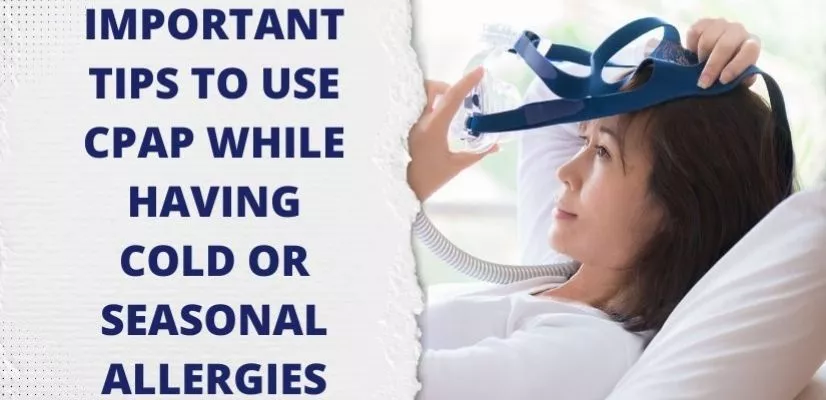If you use a Continuous Positive Airway Pressure (CPAP) machine for your sleep apnea treatment, you must face some challenges in changing seasons when you’re dealing with colds, flu, and/or allergies. Sleep apnea causes breathing issues while sleeping and in changing seasons, flu and allergies can aggravate these problems to a much higher extent.
CPAP with a Cold
- If you catch a cold, you might wonder if using your continuous positive airway pressure (CPAP full form) equipment is still safe. Although CPAP is an excellent treatment for sleep apnea, but if your nose becomes congested or throat sore, would it make it better or worse?
- The quick and simple answer is that if you have a self-limiting respiratory ailment that prevents you from breathing, the CPAP will not be beneficial. The gadget delivers a pressured stream of air to your lungs, preventing airway obstruction in otherwise healthy lungs.
- Infections in the upper respiratory tract, such as the common cold or influenza, might make using CPAP machines more difficult. Allergies can cause the nose to become clogged, stuffed, and runny, similar to what occurs with allergies. If you use a nasal mask and have a congested nose, it may be difficult to breathe with the equipment.
- The CPAP mask can get contaminated by mucus discharge, particularly when using nasal cushions. According to studies, allowing microorganisms to grow and multiply on a contaminated mask might lead to secondary infection.
- If you have a sore throat, the airflow may irritate it and trigger coughing episodes. Opening your mouth each time you cough may make the incoming pressure even more painful.
Allergies and CPAP
- You can manage allergies with OTC drugs or lifestyle changes. But allergies paired with OSA require specialized treatment like CPAP therapy.
- OSA is commonly treated with CPAP (Continuous Positive Airway Pressure). CPAP therapy effectively relieves disorganized breathing from OSA and nighttime allergies by keeping airways open during sleep. Managing OSA with allergies requires specialized treatments like CPAP, whereas allergies can be managed with OTC drugs or lifestyle changes.
- Can patients with allergies safely use CPAP while on PAP or CPAP? This is a common question we receive.
- Yes, it is. However, if your congestion makes it difficult to use your CPAP machine, we recommend experimenting with different masks. When you have allergies, a new mask may be necessary to keep you utilizing your CPAP machine.
- A full-face CPAP mask ensures you’re receiving air even when your nose is congested.
Disclaimer
The information provided is for general knowledge only. Consult your doctor for personalized advice and treatment. Medikart HealthCare is not liable for any actions taken based on this info.

